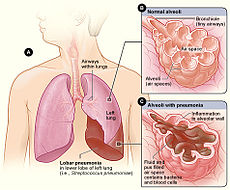
Back Longontsteking Afrikaans Lungenentzündung ALS ኒሞንያ Amharic Pneumonía AN ذات الرئة Arabic التهاب رئوى ARZ নিউম'নিয়া Assamese Neumonía AST न्यूमोनिया AWA Ağciyər iltihabı Azerbaijani
| Pneumonia | |
|---|---|
| Classification and external resources | |
 | |
| ICD-10 | J12., J13., J14., J15., J16., J17., J18., P23. |
| ICD-9 | 480-486, 770.0 |
| DiseasesDB | 10166 |
| MedlinePlus | 000145 |
| eMedicine | topic list |
| MeSH | D011014 |
Pneumonia is a disease of the lungs and the lower respiratory system. The lung contains many small bulbs, or sacs, called alveoli. These help to take out oxygen from the air. In the case of pneumonia, these bulbs become inflamed. The lungs fill up with a fluid which is called pus, and can no longer absorb as much oxygen as before. This is called empyema or emphysema (emp-ee-eema). This makes it hard for the person with pneumonia to breathe. They may feel out of breath, or like they are drowning. They may also feel pain when they breathe. Sometimes people die (30% of patients under 65) of pneumonia, even when they go to a hospital and take medicine (21% in-hospital mortality rate all patients ages).